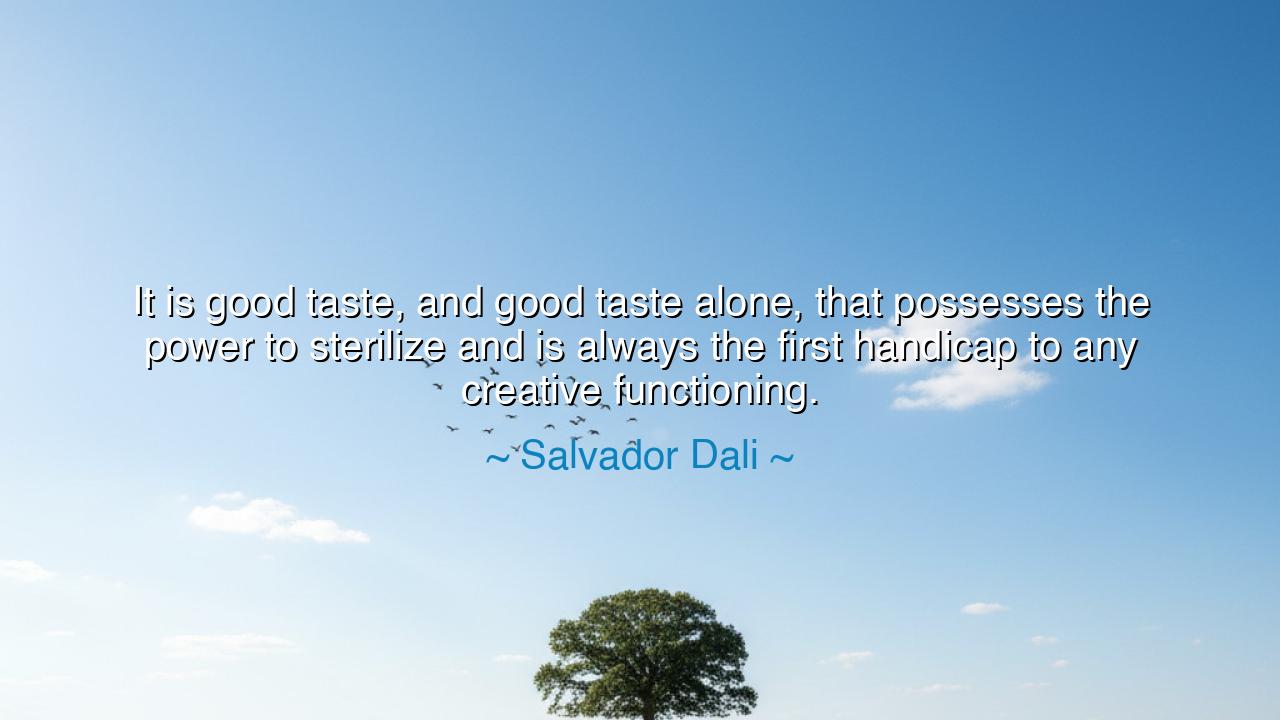
It is good taste, and good taste alone, that possesses the power
It is good taste, and good taste alone, that possesses the power to sterilize and is always the first handicap to any creative functioning.






When Salvador Dalí declared, “It is good taste, and good taste alone, that possesses the power to sterilize and is always the first handicap to any creative functioning,” he was not merely mocking convention; he was unveiling one of the deepest truths of the human spirit. For what is good taste, if not the golden chain that binds the imagination to the approval of others? To Dalí, that wild prophet of surrealism, good taste was the great deceiver — a mask of refinement concealing the fear of ridicule, the dread of being different. He saw that creativity, like fire, must burn freely or not at all; and wherever taste imposes its cold hand, that fire is smothered, leaving only the ashes of imitation.
The words of Dalí are born from rebellion — from a war against mediocrity disguised as elegance. In his time, art had become a temple of manners, where painters bowed to critics and creators whispered what should have been shouted. Dalí shattered that temple with the hammer of audacity. He painted melting clocks, dreamscapes of distortion, visions born not of decorum but of madness, not of reason but of instinct. To him, sterility was not the absence of skill, but the absence of courage — the paralysis that comes when one seeks to please rather than to create. His was the creed of the fearless: that art must offend before it can awaken, must startle before it can inspire.
The ancients too knew this truth. In Athens, when Socrates questioned the gods of tradition, when he dared to challenge the “good taste” of his city, he was condemned to drink poison. Yet his death gave birth to philosophy itself. The “sterilizing power” of good taste — that yearning for respectability — has ever been the enemy of transformation. The artist, the thinker, the prophet: all must dare to be vulgar before they are understood. For what the world first calls ugliness, it later names genius. Every new vision begins as a blasphemy against the old gods of taste.
Look also to Vincent van Gogh, who in his lifetime was ridiculed for his rough brushstrokes, his violence of color, his lack of “refinement.” Critics dismissed him as mad, untrained, tasteless. Yet in his madness burned a purity of vision no “polished” artist could touch. The world, still bound by its rules of beauty, was blind to his truth. Only after his death did men see that he had painted not what was seen, but what was felt — the fire of the soul itself. Thus Dalí’s warning proves eternal: when you seek the approval of taste, you trade your soul’s fire for applause that fades with the fashion of the hour.
Dalí’s defiance is not only for artists — it is for every soul that seeks to live authentically. In every age, good taste wears new clothes: social norms, professional decorum, moral expectations. It whispers, “Do not stand out. Do not offend. Do not be strange.” And so, many live their lives within narrow bounds, painting their days in timid colors. But life, like art, demands boldness. To be truly alive is to be willing to shock, to fail, to be misunderstood. The creator’s heart must embrace the chaos that good taste fears — for it is only in chaos that the new can be born.
Yet Dalí did not call for ugliness or vulgarity for its own sake. His rebellion was sacred, not senseless. He knew that the artist who destroys all rules without vision creates only noise. But the artist who dares to break rules in pursuit of truth creates the sublime — beauty beyond form, beyond taste. Thus, he taught that the greatest art springs from instinct purified by purpose, not by conformity. The truly great do not ask, “Will this be approved?” but rather, “Does this awaken something real?” To create is to serve the unseen — to bring forth what the timid cannot even name.
So, my children of the future, learn from Dalí’s fire. Beware the comfort of good taste, for it is the opiate of the creative soul. Let your ideas offend before they are understood; let your dreams terrify before they are admired. Seek not to be correct, but to be alive. In your work, in your speech, in your very living, dare to paint outside the lines. For though the polished may be praised, it is the untamed who move the world.
And remember this eternal law: Good taste preserves, but it never creates. Creation demands risk, demands folly, demands the courage to look foolish in the eyes of the wise. So cast off the golden shackles, and walk boldly into the wilderness of your imagination. There, where “taste” is silent and truth alone speaks, you will find the source of all art, all innovation, and all freedom — the boundless, holy fire of the creative soul.






AAdministratorAdministrator
Welcome, honored guests. Please leave a comment, we will respond soon